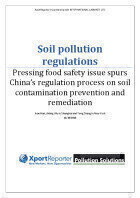Soil Remediation
Soil pollution regulations
Dec 12 2013
Author: Ivan Han, Jinling Wu in Shanghai and Tong Zhang on behalf of XportReporter
Pressing food safety issue spurs China’s regulation process on soil contamination prevention and remediation. Prevention and control of soil pollution has become the latest environmental issue to reach the top of China’s legislative agenda in recent months, following revelations earlier this year that portions of the country’s rice supply was tainted with the toxic heavy metal, cadmium. The country’s Ministry of Environmental Protection (MEP) plans to release a comprehensive action plan on soil pollution soon, the ministry announced on 8 December. The MEP has also set a timeline though 2017 for legislative measures.
Soil remediation is still a relatively new concern for the country, which has a host of other environmental issues it has pledged to tackle. Investment in soil remediation is expected to reach the thousands of billions yuan, exceeding funds planned for water and air pollution control measures, which are also large financial undertakings by the government. This could open a soil restoration market in the country, which currently accounts for just 3.7% of China’s environmental services industry, Xinhua news agency reported on 8 December, citing MEP officials.
Specifically, soil remediation will focus on protecting farmland and water resources, controlling sources of pollution, risk management of contaminated land, demonstration projects, and monitoring and supervision.
The country’s soil contamination has drawn increased attention as Guangzhou municipal government released a report in May suggesting almost half of the rice sampled in the market was found to be tainted with cadmium that can damage kidneys and bones. Two subsequent local surveys in the broader area surrounding Guangzhou showed contamination levels of 5.8% and 1.4% of provincial supplies.
Thus far, researchers have found that 28% of soil collected in parts of the Pearl River Delta contained high levels of mercury, cadmium, lead and arsenic. The report also said that some cities were found to have abnormal levels of radiation, exceeding the limit by 50%.
Unlock this White Paper for Full Access
Events
IWA World Water Congress & Exhibition
Aug 11 2024 Toronto, Canada
Aug 25 2024 Stockholm, Sweden and online
Sep 03 2024 Mexico City, Mexico
Sep 03 2024 Mexico City, Mexico
Sep 03 2024 San Diego, CA, USA










